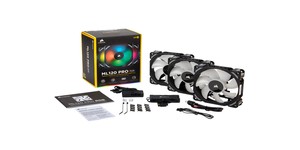Nanoxia announces Special NNV vibration-damping fan family
January 19, 2017 | 10:35
Companies: #nanoxia

Nanoxia has announced a new series of fans, making use of a vibration-damping technology developed for the German car industry and which the company claims it has the sole rights to implement in PC hardware.
The Nanoxia Special NNV Series represents, the company gently puns, 'a real revolution for the fan market'. The secret sauce: a technology originally developed for the automotive industry and for which Nanoxia has licensed the patent giving it exclusive rights to implement within the confines of the PC market, greatly reducing the transmission of vibration from the fan to the case.
The technology inside the Special NNV fan family takes the form of two frames. The outer frame forms the mounting system, attaching to a case, CPU, or radiator in the usual manner; the inner frame, however, holds the fan rotor and motor, and is decoupled from the mounting frame through four rubber dampers. The result: Vibration from the motor is massively reduced before it gets a chance to reach the case, Nanoxia claims.
The premium feel of the fans is further enhanced, Nanoxia gushes, with the inclusion of a new mounting kit based around push-pin bolts. As well as further reducing vibration, the bolts are quicker to sink home than screws and can be removed and reused without marking the fan or the case.
The company has confirmed the launch of four 120mm models to start. The first to hit the market will be a pulse width modulated (PWM) speed-controlled fan, boasting a rotation speed of 400 to 1,650 revolutions per minute (RPM) for a maximum airflow of 52.6 cubic feet per minute (CFM) at a peak noise level of 24.6 dbA. This will be followed by fixed-speed versions running at 800, 1,200, or 2,000 RPM, offering 27.2CFM at 6.1 dBA, 44.7CFM at 17.7 dBA, and 73CFM at 29 dbA respectively.
The PWM version is expected to hit the market in mid-February, with the fixed-speed versions following in the weeks after. Nanoxia has confirmed a manufacturer's suggested retail price (MRSP) of €21.99 including VAT (around £19) for all models.
The Nanoxia Special NNV Series represents, the company gently puns, 'a real revolution for the fan market'. The secret sauce: a technology originally developed for the automotive industry and for which Nanoxia has licensed the patent giving it exclusive rights to implement within the confines of the PC market, greatly reducing the transmission of vibration from the fan to the case.
The technology inside the Special NNV fan family takes the form of two frames. The outer frame forms the mounting system, attaching to a case, CPU, or radiator in the usual manner; the inner frame, however, holds the fan rotor and motor, and is decoupled from the mounting frame through four rubber dampers. The result: Vibration from the motor is massively reduced before it gets a chance to reach the case, Nanoxia claims.
The premium feel of the fans is further enhanced, Nanoxia gushes, with the inclusion of a new mounting kit based around push-pin bolts. As well as further reducing vibration, the bolts are quicker to sink home than screws and can be removed and reused without marking the fan or the case.
The company has confirmed the launch of four 120mm models to start. The first to hit the market will be a pulse width modulated (PWM) speed-controlled fan, boasting a rotation speed of 400 to 1,650 revolutions per minute (RPM) for a maximum airflow of 52.6 cubic feet per minute (CFM) at a peak noise level of 24.6 dbA. This will be followed by fixed-speed versions running at 800, 1,200, or 2,000 RPM, offering 27.2CFM at 6.1 dBA, 44.7CFM at 17.7 dBA, and 73CFM at 29 dbA respectively.
The PWM version is expected to hit the market in mid-February, with the fixed-speed versions following in the weeks after. Nanoxia has confirmed a manufacturer's suggested retail price (MRSP) of €21.99 including VAT (around £19) for all models.

MSI MPG Velox 100R Chassis Review
October 14 2021 | 15:04








Want to comment? Please log in.